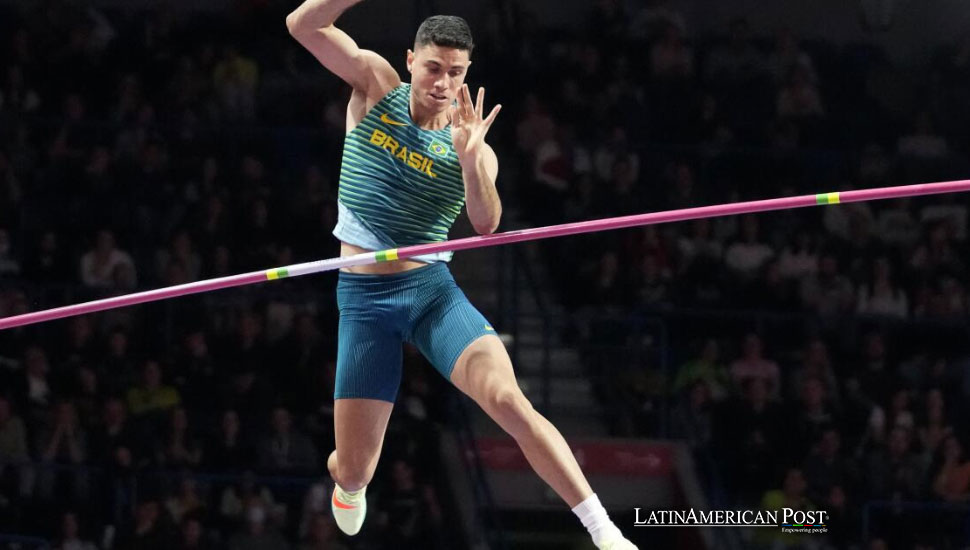Brazilian Pole Vaulter Thiago Braz is Suspended and will Miss the Paris Olympics.

Thiago Braz, Olympic pole vault champion, faces a 16-month suspension for testing positive for a banned substance, jeopardizing his career and participation in the Paris 2024 Olympics.
Thiago Braz, the celebrated Brazilian pole vaulter who clinched gold at the 2016 Rio Olympics and bronze at the Tokyo 2020 Games, has been handed a 16-month suspension by the Athletics Integrity Unit (AIU). The suspension comes after Braz tested positive for glucuronide of ostarine, a prohibited substance, which he claims was ingested through contaminated sports supplements.
The AIU provisionally suspended Braz on July 28, 2023, following a positive test during a Diamond League meeting in Stockholm on July 2, 2023. Braz’s suspension will last until November 27, 2024, which means he will miss the Paris 2024 Olympics, a significant blow to his career and Brazil’s hopes for the games.
Glucuronide of ostarine is a metabolite of ostarine, a substance banned under the World Anti-Doping Agency (WADA) category S1 for its ability to enhance muscle growth and athletic performance. Despite Braz’s assertion that he inadvertently consumed the substance through sports supplements, the AIU’s decision underscores the strict liability athletes face regarding banned substances in their bodies.
A Stellar Career Tainted
Thiago Braz’s rise to prominence in the pole vaulting world is a testament to his talent and dedication. His victory at the Rio 2016 Olympics was a personal triumph and a significant moment for Brazil, as he set a new Olympic record with a vault of 6.03 meters. His performance brought immense pride to his home country and positioned him as one of the top athletes in his discipline.
Braz continued to perform at a high level, securing a bronze medal at the Tokyo 2020 Olympics. His achievements solidified his status as one of the sport’s elite competitors. However, the doping violation casts a shadow over his accomplishments and raises questions about the integrity of his performance.
Doping scandals have plagued the world of athletics for decades, undermining the credibility of competitions and the achievements of athletes. The use of performance-enhancing drugs (PEDs) has led to numerous high-profile suspensions and tarnished the reputations of celebrated sports figures.
In Latin America, doping cases have had significant repercussions. The region has produced many world-class athletes who have faced scrutiny and sanctions for doping violations. These incidents highlight the ongoing battle against doping and the efforts of organizations like the AIU and WADA to maintain fair competition.
The AIU plays a crucial role in ensuring the integrity of athletics by enforcing anti-doping regulations and promoting fair play. Established by the International Association of Athletics Federations (IAAF), the AIU is responsible for overseeing doping control processes, conducting investigations, and issuing sanctions for violations.
In Braz’s case, the AIU initially sought a four-year suspension, reflecting the seriousness of the offense. The eventual 16-month suspension indicates a consideration of mitigating factors, such as Braz’s claim of unintentional ingestion. Nevertheless, the AIU’s decision emphasizes the importance of strict compliance with anti-doping rules.
Consequences for Thiago Braz and Brazilian Athletics
Braz’s suspension is a significant setback for Brazilian athletics. As one of the country’s top athletes, his absence from major competitions, including the Paris 2024 Olympics, will be deeply felt. Brazil has a rich history in athletics, and Braz’s achievements were a source of national pride. His suspension affects his career and the broader perception of Brazilian sports on the international stage.
For Braz personally, the suspension is a challenging blow. Athletes dedicate their lives to their sport, and a doping violation can have long-lasting effects on their reputation and career prospects. The athletics community will closely watch Braz’s efforts to clear his name and return to competition.
Doping control remains a critical issue in Latin American sports. The region has seen a mix of progress and setbacks in the fight against performance-enhancing drugs. While some athletes and organizations have taken strong stances against doping, challenges persist in ensuring rigorous enforcement and education about the risks and consequences.
Latin American athletes have often been caught in doping scandals, highlighting the need for robust anti-doping programs. The case of Thiago Braz underscores the importance of vigilance and strict adherence to anti-doping regulations to protect the integrity of sports.
Historical Context and Future Prospects
Doping in sports is not a new phenomenon. Historical records show that athletes have sought competitive advantages for centuries. However, the modern era of doping control began in earnest in the latter half of the 20th century, with the establishment of organizations like WADA and national anti-doping agencies.
Latin America has had its share of high-profile doping cases. These incidents have spurred efforts to improve anti-doping education and enforcement across the region. The ongoing work of international and regional bodies is crucial in creating a level playing field for athletes.
As Thiago Braz serves his suspension, the broader athletics community will continue to grapple with the challenges of doping. Committing to clean sport requires continuous effort from athletes, coaches, organizations, and regulators.
Also read: Natalia Linares Continues Winning Streak in Long Jump Competitions
Thiago Braz’s suspension for doping is a stark reminder of the stringent regulations governing modern athletics. While the circumstances of his positive test may involve unintentional ingestion, the consequences are severe, impacting his career and Brazil’s athletic aspirations. The fight against doping is a complex and ongoing battle, requiring diligence and cooperation from all stakeholders in the sports community.
As Braz navigates this difficult period, the focus remains on upholding the principles of fair competition and integrity in athletics. His story is a cautionary tale and a call to action for athletes worldwide to stay vigilant and committed to clean sport.





